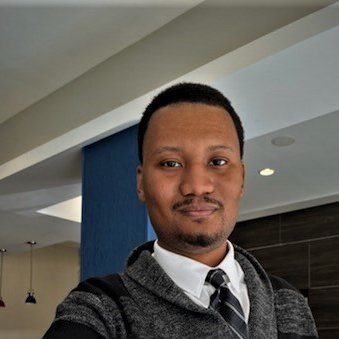Summary of (September) Fellows Research Presentations

Brandon Stokes is a doctoral candidate in the Department of African American & African Diaspora Studies at Indiana University-Bloomington. His research focus is on housing and urban development concerning African Americans on Chicago’s southside with an emphasis on the intersection of race and class. Presently, Brandon is the Instructor for the Atkins Living Learning Center’s Foundational Course and a 2021-2022 HASTAC Scholar for Indiana University’s Institute for Digital Arts and Humanities. Additionally, Brandon volunteers writing grants for 360 Nation, a Chicago based nonprofit focused on urban agriculture, youth development and community revitalization.
Project Title: A Divided Bronzeville: How Race and Class Created Separate Housing Institutions for African Americans in the Black Metropolis
Abstract: This project examines two housing complexes within the African American Bronzeville neighborhood of Chicago’s South Side. It will analyze why Lake Meadows, a privately constructed high rise complex, seen as an example of success the Ida B Wells Homes, constructed publicly by the Chicago Housing Authority’s seen as a failure. This investigation looks at the intersection of race and class to tell the story of housing in Bronzeville.
Facilitator/Discussant: Lionel Kimble, PhD is an Associate Professor, History at Chicago State University. His research interests include Black Chicago, World War II, US Labor and Working Class History, Civil Rights and History of Illinois.

Peter Kent-Stoll is a sociologist who studies how racism and colonialism intersect through state policies and the production of urban space. His dissertation, "Imperial Metropolis: Settler Colonialism and Antiblackness in Chicago, 1952-1972," examines how the Bureau of Indian Affairs Relocation Program and Urban Renewal in Chicago shaped the racialization and colonization of urban space in Chicago. A recent theoretical paper by Kent-Stoll, “The Racial and Colonial Dimensions of Gentrification,” was published in Sociology Compass. In another line of research, he examines the connections between W.E.B. Du Bois’s urban and decolonial theories. In addition to the fellowship support of the Black Metropolis Research Consortium, Kent-Stoll’s research has been supported with funding from the UMass Amherst Graduate School, the W.E.B. Du Bois Center at UMass Amherst, and the Phi Kappa Phi Honors Society.
Project Title: The Settler Colonial and Anti-Black Foundations of Urban Renewal in Chicago
BMRC Research Project:
Kent-Stoll’s current research project examines the intersections between the Bureau of Indian Affairs’ Relocation program and Urban Renewal in Chicago from 1952 to 1972, analyzing their role in the dispossession of Black and Indigenous people and in shaping the racial geography of urban space and property relations. Relocation targeted Native Nations for termination while promoting colonial assimilation through rural to urban migration. At the same time, Urban Renewal displaced Black families for urban redevelopment projects catered to white middle- and upper-class consumption. Kent-Stoll examines these dynamics in Chicago because both Urban Renewal and Relocation there served as templates for these policies on a national scale. His historical sociological analysis engages with scholarship in Black studies and Indigenous studies that seeks to understand the relations between settler colonialism and antiblackness and between Black and Indigenous liberation movements. I revisit the history of Urban Renewal by bringing into the same analytical framework the history of Urban Indian Relocation, which has been treated as a separate phenomenon in historical accounts. Analyzing the connections between these state policies, I examine intersecting racial, colonial, and class struggles over Urban Renewal and Urban Relocation to track the divergences and convergences of Black and Indigenous political struggles in Chicago and what these illuminate about the differential racialization of space and differing political articulations and contradictions that emerged as a result.
Facilitator/Discussant: Sarah E.K. Fong is an Assistant Professor of Studies in Race, Colonialism, and Diaspora at Tufts University.